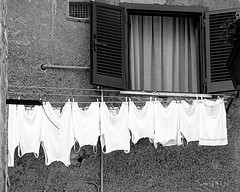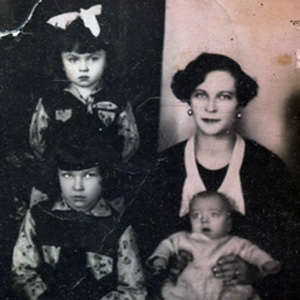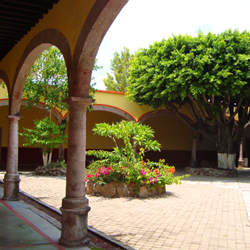 I recently reminisced about my son’s visit to England when he was eighteen.He took his bike with him and had his itinerary well planned. It included a trip to Hatherleigh, a little town in Devon where my family spent a year when my parents were reunited after their long wartime separation. The Soviets had deported them to a camp in the north of Russia in 1940 and there, three months later, I was born. After Hitler’s attack on the Soviet Union, Stalin was forced to release his Polish prisoners as a condition of joining the western allies. My father then joined the army of General Wladyslaw Anders, while my mother, sisters and I journeyed through Iran, India and then settled in Tanzania (then British East Africa) where we stayed for six years.
I recently reminisced about my son’s visit to England when he was eighteen.He took his bike with him and had his itinerary well planned. It included a trip to Hatherleigh, a little town in Devon where my family spent a year when my parents were reunited after their long wartime separation. The Soviets had deported them to a camp in the north of Russia in 1940 and there, three months later, I was born. After Hitler’s attack on the Soviet Union, Stalin was forced to release his Polish prisoners as a condition of joining the western allies. My father then joined the army of General Wladyslaw Anders, while my mother, sisters and I journeyed through Iran, India and then settled in Tanzania (then British East Africa) where we stayed for six years.
It was 1948 when we got to England. Poles were no longer comrades-in-arms and the heroes of the Battle of Britain but competitors for scarce jobs and an extra expense in the welfare budget. With the media, the Labour government and the labour movement making no secret of the fact that they wanted the Poles to “go home”. It was a bitter time for many Polish veterans and their families.
But the people of Hatherleigh, where we were the lone Polish family, were untouched by this wave of hostility, and their warmth and friendship offset the damp and chilly English weather, a stark contrast to the sunshine and heat of equatorial Africa. My son’s visit there 35 years later proved that I wasn’t just indulging childhood fantasies about the British. Armed with the name and address of our landlady, he arrived in the village and headed for the post office to make enquiries.
“The Polish family that took rooms with the Crockers?” It might as well have been only last week to hear the man speak of it. The elder Crockers, who had owned the house, had long since died but the postmaster immediately got on the phone, located their granddaughter, my old playmate, and Pierre soon experienced the warmth and hospitality that he had so often heard about from me. They kept him longer than he had planned to stay but getting away from people so happy to see him was not easy. People are often surprised by this story, saying that the English are not, as a rule, like that but generalizations, or their nastier cousins, stereotypes, serve little purpose other than to impair one’s vision and prevent independent judgment.
To return to my fond memories of Hatherleigh, I recall that when my sisters and I arrived at school, Mr. Brown, the wise and kindly headmaster, immediately placed us in classes with our own peer group rather than holding us back until we “learned the language.” Sensitive to our feelings, he also realized that we would learn the language more quickly with children our own age since natural friendships are more of an aid to acquiring a language than uninteresting, forced conversations with younger children. And so it was.
In preparation for life in chilly England, Mother had some warmer clothing made for us before we left Africa and picked up a few other things once we got there. This was still a time when nobody bought clothes needlessly, certainly not in Hatherleigh, so as I recall my sisters and I were dressed as well as any of our schoolmates. I was soon to discover, however, that one can’t judge by external appearance alone. The gym costume for very young children such as I (then in second grade), turned out to be nothing more than our underwear. Lest anyone think the English were overly permissive I hasten to add that boys and girls were segregated for this class. As my classmates and I gathered in a large room that served as a gymnasium, everyone began removing her dress. Although we had known one another a very short time, I already had enough confidence in my new best friend, Margaret, to follow her example in all things and so, I too removed my dress. It was then that I saw, for the first time, what English girls wore under their dresses. Woollen bloomers and undershirts! And I, the Polish African? Nothing but a pair of figi, very tiny cotton panties. A topless bikini avant la lettre. I don’t understand why I’m not overcome with eternal embarrassment when I think of this. I can only assume that either I have a pretty thick skin or the children of Hatherleigh simply weren’t nasty. I don’t recall running and hiding, nor enduring finger-pointing and giggling. Nevertheless, I did report this surprising observation about English undergarments and Mother did get me some woolly shirts and bloomers that were from that point incorporated into my wardrobe. Still later in our long post-war journey, in cold, cold Canada, I was to discover even worse horrors.
The best thing about Hatherleigh, however, was that I finally met the father that I had heard about for so long. He lived up to all my expectations.
Every day Father went off on his bicycle “to work” in the nearby town of Okehampton which seemed to be what everyone’s father did as well. I didn’t give much thought to what exactly he did there. Having fathers around at all – not just my own father but all fathers — was something new. In Africa, where my world had been populated almost entirely by women and children, fathers had been only an idea, a memory and a photograph.
It was only years later that I discovered the nature of my father’s work in Okehampton. Among my father’s papers I found a number of diplomas testifying to a variety of skills he had acquired in England, among them bookkeeping, mechanical repairs and shoe repair. Later still, while rummaging about in archival documents about the Polish Resettlement Corps, I discovered these were the classes offered to the officers and men of the Polish forces to retrain them for civilian life in a new country, preferably not England. As it turned out, he ended up working in his own profession in Canada but I do recall that he was awfully good at fixing all kinds of things. Among the more intriguing tools in his toolkit was an awl that he would get out whenever one of his young and slender daughters wanted an extra hole made in a belt. Where did you get that? – I would ask. A man must be prepared for all eventualities, he would reply with a mysterious smile. He made his own wallets too, of a style unlike any sold in the stores and one he claimed was infinitely superior to the commercial variety.
There was one other skill that amused me but it had nothing to do with his “retraining” in Okehampton. He used to darn socks. In the 1950s, there were still some people around who darned their socks rather than replacing them at the first sign of wear but this was a task invariably undertaken by a woman. My friends could hardly believe a man – a war veteran to boot! – would darn socks, so we resolved to find out how he learned to do this. The answer impressed even the most macho of the boys in my group. In Italy, during the war, there were some tense times when the guns were quiet but the silence was ominous. At a time like this, the men smoked. My father, who didn’t smoke, found darning socks a suitable substitute. He would give away his cigarette ration and his buddies gave him their socks. I can still see him at this task looking so serene – but now that I know something about smoking I wonder, did it help ease the stress that must have been such a big part of his life?
CR
Imagery
“Underwear” by XcBiker from creativecommons.org



